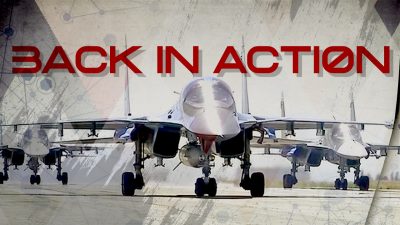Video: Russian Warplanes Back in Idlib Signaling No Progress in Putin-Erdogan Negotiation

All Global Research articles can be read in 51 languages by activating the “Translate Website” drop down menu on the top banner of our home page (Desktop version).
Visit and follow us on Instagram at @crg_globalresearch.
***
After a short hiatus amid the meeting between Turkish President Recep Tayyip Erdogan and Russian President Vladimir Putin, airstrikes on Syria’s Greater Idlib have made a comeback.
On October 3rd, the Russia’s Aerospace Forces (VKS) carried out strikes on the area, targeting Hay’at Tahrir al-Sham (HTS) positions.
According to the London-based Syrian Observatory for Human Rights, the raids targeted the outskirts of the town of Kinda in the western countryside of Idlib as well as the al-Akrad Mount in the northern Lattakia countryside.
Recent reports claim that HTS and its allies are preparing a provocation in Greater Idlib with chemical-armed rockets, possibly to hinder any operation by the SAA.
With help from the Western-backed White Helmets organization and the Turkistan Islamic Party, HTS moved eight newly-made rockets, armed with chlorine and sarin from one of its headquarters in the outskirts of Idlib city to al-Ghab Plains in the northwestern Hama countryside.
HTS believes that a false-flag chemical attack in Greater Idlib could provoke military strikes by the US and its Western allies against the SAA. This is not too far-fetched, as the US-led coalition has bombed Syrian government positions in the past following alleged chemical attacks carried out by the Bashar al-Assad government.
Meanwhile, in a sign of improvement of their bilateral relations, the royal Jordanian palace announced that King Abdullah had received a phone call from Syria’s President, the first such call in 10 years.
During the phone call, King Abdullah and President Assad discussed bilateral ties and means of enhancing cooperation between their respective countries.
Just two weeks earlier, Syrian Defense Minister and Chief of Staff Ali Ayyoub paid a visit to Jordan where he discussed “fighting terrorism and border control” with the Kingdom’s military leadership. Later on September 23, Syrian Foreign Minister Faisal Mekdad met with his Jordanian counterpart in New York on the side line of the United Nations General Assembly meeting.
Damascus, having consolidated power in most of the country and especially amid the recent success in Dara’a, is beginning to return on the local and even international scene, attempting to restore bilateral relations and take part in various international forums.
As a result, it is not also too unexpected that a large-scale ground operation in Greater Idlib is impending, as this is the only significant militant pocket left in the country. To carry it out, the government needs as much support as it can get, in order to guarantee that as little outside meddling is allowed.
*
Note to readers: Please click the share buttons above or below. Follow us on Instagram, @crg_globalresearch. Forward this article to your email lists. Crosspost on your blog site, internet forums. etc.
SUPPORT SOUTHFRONT:
PayPal: [email protected], http://southfront.org/donate/ or via: https://www.patreon.com/southfront

